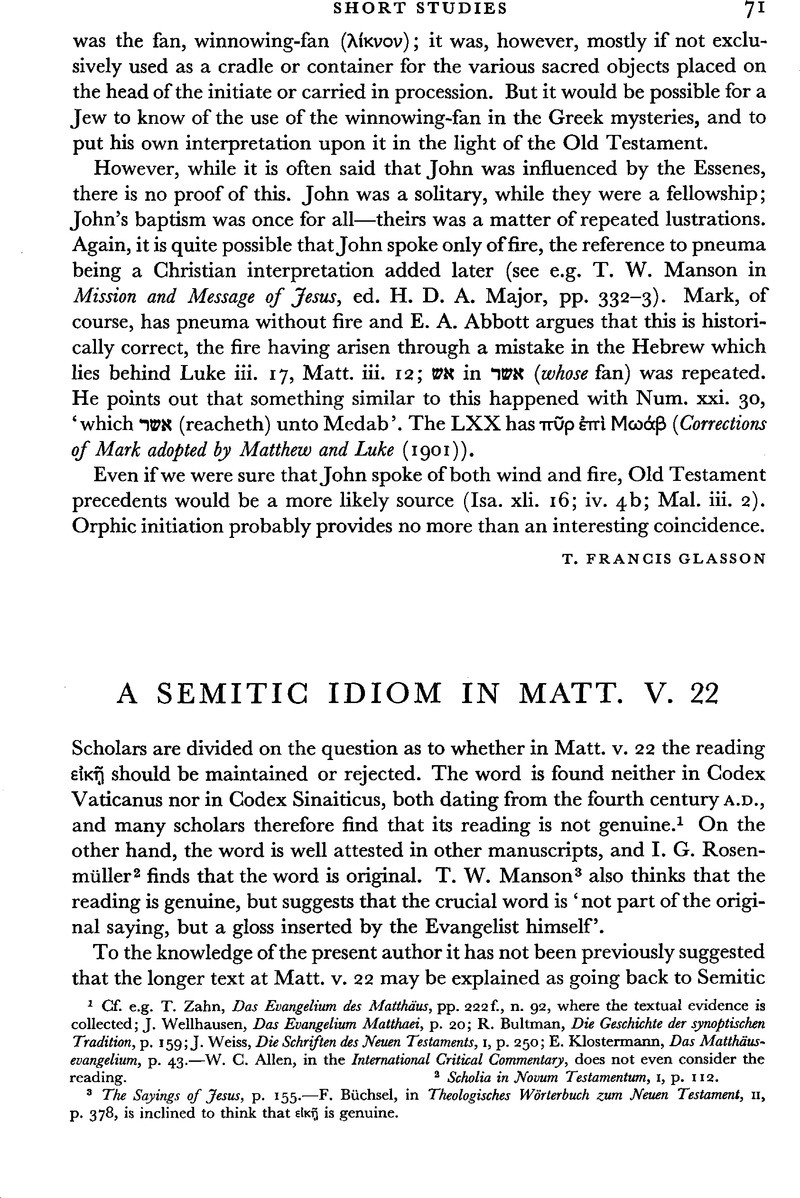Article contents
A Semitic Idiom in Matt. v. 22
Published online by Cambridge University Press: 05 February 2009
Abstract

- Type
- Short Studies
- Information
- Copyright
- Copyright © Cambridge University Press 1956
References
Page 71 note 1 Cf. e.g. T. Zahn, Das Evangelium des Mattháus, pp. 222 f., n. 92, where the textual evidence is collected; J. Wellhausen, Das Evangelium Matthaei, p. 20; R. Bultman, Die Geschichte der synoptischen Tradition, p. 159; J. Weiss, Die Schriften des Neuen Testaments, 1, p. 250; E. Klostermann, Das Mattháusevangelium, p. 43.—W. C. Allen, in the International Critical Commentary, does not even consider the reading.
Page 71 note 2 Scholia in Novum Testamentum, 1, p. 112.
Page 71 note 3 The Sayings of Jesus, p. 155.—F. Büchsel, in Theologisches Wörterbuch zum Neuen Testament, ii, p. 378, is inclined to think that ![]() is genuine.
is genuine.
Page 72 note 1 M. Burrows, in his edition, transcribes the verb as Hiphil (![]() ), but Qal (
), but Qal (![]() ) should be read. It is clear in the facsimile that the text originally read
) should be read. It is clear in the facsimile that the text originally read ![]() but the He was effaced, and a Beth was written above the line.
but the He was effaced, and a Beth was written above the line.
Page 72 note 2 The expression ![]() is to be translated thus, and not, as is suggested by W. H. Brownlee, in The Manual of Discipline, ad loc. ‘who has not been convicted’. The prepositional expression
is to be translated thus, and not, as is suggested by W. H. Brownlee, in The Manual of Discipline, ad loc. ‘who has not been convicted’. The prepositional expression ![]() occurs in a number of passages in the Manual and is the exact equivalent of
occurs in a number of passages in the Manual and is the exact equivalent of ![]() ‘without’, cf. M. H. Segal, Mishnaic Grammar, p. 206, and see G. R. Driver, in Jewish Quart. Rev. n.s. XLIV (1953–4), p. 16 n. 29, after C. Rabin.
‘without’, cf. M. H. Segal, Mishnaic Grammar, p. 206, and see G. R. Driver, in Jewish Quart. Rev. n.s. XLIV (1953–4), p. 16 n. 29, after C. Rabin.
Page 72 note 3 Cf. the Fragments, VIII, 5.
Page 73 note 1 ‘Der jähe, leidenschaftliche Zorn’, Weiss, J., op. cit., loc. cit.Google Scholar
Page 73 note 2 Torrey, C. C., in The Four Gospels. A New Translation, p. 10, is therefore right in rendering ‘Any man who harbours anger’.Google Scholar
- 1
- Cited by


